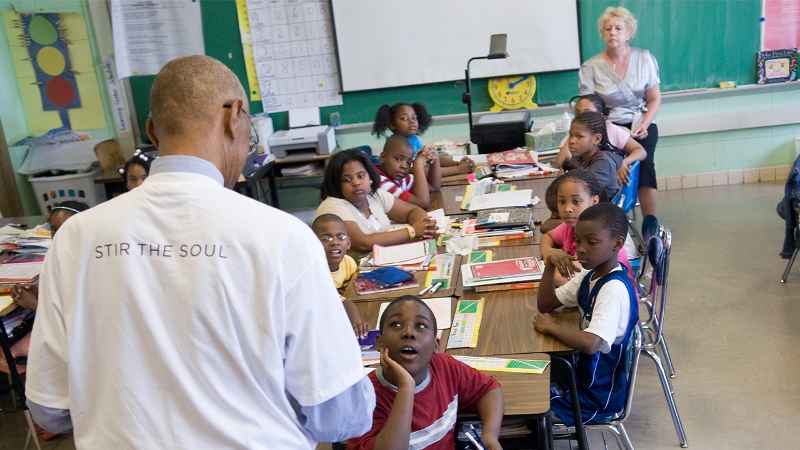Personalized Primary Science Tuition Singapore to Cater to Your Child’s Needs
Personalized Primary Science Tuition Singapore to Cater to Your Child’s Needs
Blog Article
A Comprehensive Overview to the Various Knowing Techniques in Key Scientific Research Instruction
The expedition of varied knowing methods in primary scientific research direction presents a possibility for instructors to improve student involvement and understanding substantially. By taking a look at hands-on knowing strategies, inquiry-based techniques, and collaborative strategies, we can determine effective techniques that cater to various discovering styles.

Hands-On Learning Techniques
Hands-on knowing methods play a critical function in main scientific research guideline, involving pupils in energetic expedition and trial and error. These approaches allow learners to interact directly with materials and phenomena, cultivating a deeper understanding of clinical principles. By utilizing manipulatives, models, and real-life experiments, educators create an environment where students can observe, assume, and examine their concepts.
Such strategies not just improve comprehension however also cultivate crucial thinking and problem-solving abilities. When pupils get involved in tasks like developing easy devices, planting seeds, or conducting chain reactions, they are encouraged to ask inquiries and look for responses through their own monitorings. This experiential technique assists to demystify intricate scientific concepts, making them a lot more easily accessible and relatable.
Additionally, hands-on learning advertises partnership among peers, as pupils commonly function in groups to conduct experiments or share searchings for. This teamwork not just enhances their learning experience yet likewise creates necessary social abilities. Inevitably, integrating hands-on strategies in primary scientific research direction cultivates a lifelong love of understanding and interest concerning the environment, laying a solid foundation for future scholastic quests in scientific research and beyond.
Inquiry-Based Discovering
Inquiry-based learning is a training approach that motivates pupils to ask questions, explore phenomena, and build their very own understanding of scientific ideas. This approach moves the emphasis from traditional teacher-led direction to a much more student-centered experience, where learners take the effort in their instructional trip. By fostering interest, inquiry-based understanding promotes deeper involvement with the product, permitting students to check out subjects in a meaningful context.
In practice, this technique often involves hands-on experiments, observations, and important reasoning tasks that line up very closely with the clinical method. Students are motivated to develop theories, layout examinations, and assess data, which cultivates vital abilities such as problem-solving and analytical thinking. The function of the teacher in this framework is to promote exploration, leading pupils with the query process while urging independent idea and cooperation.
Additionally, inquiry-based knowing supports a feeling of ownership over the discovering procedure, motivating pupils to pursue understanding proactively. This approach not only improves understanding of scientific concepts yet additionally fosters a lifelong love for learning, outfitting students with the abilities necessary to navigate a progressively intricate world.
Collaborative Discovering Approaches
Collaborative discovering methods equip pupils to take part in meaningful interactions with peers, promoting a shared responsibility for their instructional outcomes. In key science guideline, these approaches motivate learners to work together to explore scientific concepts, resolve troubles, and conduct experiments (primary science tuition next Singapore). By taking part in team tasks, students can take advantage of diverse point of views, enabling richer understanding and retention of clinical understanding
One secret facet of joint discovering is the emphasis on interaction skills. Trainees should articulate their thoughts, pay attention actively to others, and discuss concepts, every one of which are crucial competencies in both real-world and academic contexts. This social interaction not only enhances their understanding of clinical principles yet additionally promotes team effort and problem resolution skills.
When trainees see the worth of their contributions within a group, they are more most likely to take ownership of their knowing trip. On the whole, integrating collective over here discovering methods in main science instruction cultivates a vibrant knowing setting that prepares trainees for future academic and social challenges.
Innovation Combination in Science
The assimilation of innovation in key scientific research direction improves discovering experiences by supplying innovative tools and sources that sustain different training methodologies, consisting of collaborative discovering - primary science tuition Singapore. The usage of digital platforms, simulations, and interactive applications allows pupils to engage deeply with scientific ideas, promoting a more hands-on technique to knowing
Digital laboratories, for circumstances, enable learners to perform experiments securely and effectively, advertising inquiry-based learning. These devices can mimic real-world clinical scenarios, allowing students to visualize intricate procedures that would be difficult to replicate in a conventional class setting. In addition, modern technology promotes interaction and partnership among students, as they can share findings and interact on tasks through on the internet platforms.
In addition, multimedia discussions and educational video clips can improve lessons by providing to varied understanding styles, making abstract principles a lot more available. Data analysis tools likewise encourage trainees to collect and interpret clinical information, reinforcing crucial thinking skills. In general, the calculated incorporation of modern technology in key scientific research guideline not just boosts involvement however also prepares students for a technically innovative culture, equipping them with essential abilities for future scientific endeavors.
Differentiated Guideline Strategies
Set apart direction approaches are vital for dealing with the diverse needs of learners in primary science education. These approaches enable teachers to tailor their training techniques to accommodate differing capacities, rate of interests, and discovering designs within the classroom. By using distinguished guideline, instructors can develop a comprehensive environment that fosters involvement and enhances understanding of clinical principles.
One effective method is to make use of versatile organizing, which enables students to team up with peers at comparable skill degrees or with differing viewpoints. find out here now This technique motivates peer learning and advertises crucial reasoning. Furthermore, supplying selections in tasks can empower trainees, enabling them to select jobs that resonate with their passions while still satisfying curricular goals.
Additionally, integrating tiered tasks is one more valuable technique. By creating tasks with varying degrees of intricacy, teachers can guarantee that all trainees are appropriately tested, no matter of their efficiency. Utilizing developmental analyses to evaluate recognizing more allows teachers to adjust their training techniques dynamically, guaranteeing that each learner receives the assistance they require.
Eventually, implementing separated direction methods in key scientific research education not just boosts pupil learning outcomes however also grows a passion for science, preparing students for future academic searches.

Final Thought
In recap, reliable main science guideline necessitates a complex strategy that includes hands-on understanding, inquiry-based methods, and joint methods. The integration of technology and separated direction even more caters to diverse understanding styles, fostering a setting favorable to expedition and critical reasoning.
The expedition of diverse understanding methods in primary scientific research direction offers a chance for teachers to enhance trainee engagement and understanding significantly.Hands-on understanding techniques play a crucial function in key scientific research instruction, engaging trainees in active expedition and experimentation.Inquiry-based learning is an instructional strategy that encourages students to ask concerns, explore sensations, and build their very own understanding of scientific concepts.Collaborative knowing methods encourage trainees to engage in meaningful interactions with peers, fostering a shared duty for their academic outcomes. Generally, integrating joint knowing approaches in primary scientific research instruction grows a vibrant knowing environment that prepares trainees for future academic and social obstacles.
Report this page